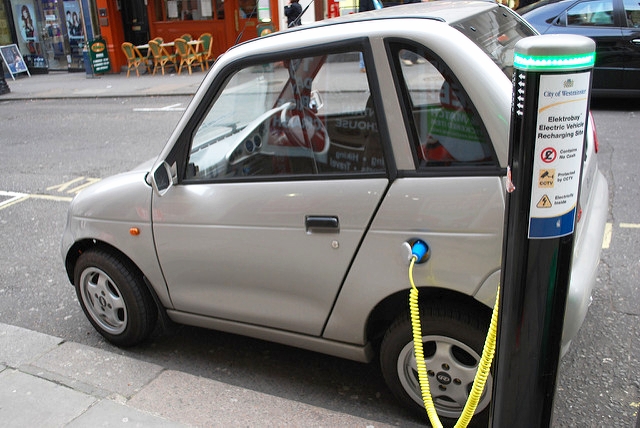Today, environmental issues have become a primary concern in society. With many policymakers, activists, and corporations alike, all seeking to inspire a greater movement to sustain the Earth, it is not surprising that the “green movement” is beginning to impact certain industries, specifically the automotive industry. According to Greentech Media, the electric car market hit a record high last year in 2016 when 750,000 electric cars were sold. There are 2 million electric cars being driven in the world today, meaning that almost half of the world's electric cars were sold last year! Although 2 million only accounts for 2% of the market for small, passenger vehicles, it is a large feat for the industry that just began scratching the surface in 2010.
China has led the electric car market, competing directly with the Detroit, Michigan automakers. Of the 750,000 electric vehicles sold last year, China sold 336,000, with much credit due to BYD, a Chinese automaker that has dominated the electric vehicle (EV) market and was responsible for roughly 1/3rd of the country's EV sales. Yet, according to electrek, BYD has recently seen sales drop 34% in early 2017 due to the Chinese government reducing electric vehicle subsidies and incentives, which have been the main reason behind the market’s rapid growth.
After China, Europe sold the second highest amount of electric vehicles, accounting for 215,000. Norway saw the highest EV sales in Europe, selling about 62,000 vehicles. Other European countries that have contributed to sales include the Netherlands, UK, France, Germany, and Sweden. The United States trailed China and Europe selling 160,000 vehicles last year.
Credit: IEA
The International Energy Agency (IEA) is optimistic about future growth in the electric car market, projecting car sales between 9 million and 20 million by 2020, and sales between 40 million and 70 million by 2025. Since this is quite a leap from last year's three quarters of a million, many wonder if these numbers are attainable. The answer is that car sales are dependent on the green movement continuing to motivate consumers into seeking more environmentally friendly transportation, as well as automakers designing more practical and less expensive electric vehicles.
It's tough enough to buy a regular gasoline car without doing a ton of research, that it's even more difficult for some people to consider electric cars too. Until electric vehicles gain more popularity, the average person may not know enough about them to know how to purchase one of if it's the right vehicle for them. Below is a list of pros and cons provided by PluginCars to aid in decision making.
Cons of Electric Cars:
- Limited driving range. A main concern about EVs is that they have a limited driving range of about 80 to 100 miles before they need to recharge. This makes it difficult to take long trips with the car because charging stations may be many miles away and it takes hours to fully recharge.
- That leads to the next con, long charging time. However, the time it takes to charge an EV completely depends on the size of its battery. As a general measure for all EVs, 1 hour of charging can put about 20-25 miles back into the car.
- EVs are expensive. The average price for an EV is between $30,000 and $40,000, which is more expensive than a standard gas-powered vehicle of its size. However, most U.S. states offer incentives for purchasing electric cars, you can view the incentives by each state here.
- Minimal consumer choice. Many of the EV models look similar, and some people do not care for the typical design of an electric car. However, this has been an issue well-addressed by automakers and many new designs have been developed or are in the development process.
Pros of Electric Cars:
- They are quiet and quick. An EV delivers a much smoother and quieter ride, and electric cars possess more torque allowing the car to accelerate faster.
- EVs can be recharged at home. Electric cars can be easily charged in the confines of your home by simply plugging in the charger into an outlet and letting it charge overnight. In the morning it will be fully charged and ready to be driven.
- EVs are cheaper to drive. The cost per mile to fuel an electric vehicle is about 1/4th the cost of gasoline. Also, because the vehicle is electric, the only maintenance costs incurred are tire rotations and maintaining inflated tires.
- They do not produce carbon emissions. Of course, the largest benefit to electric vehicles is that they do not include a tailpipe that gives off harmful chemicals into the air, therefore they produce better air quality and benefit the environment.
Clearly, there are both benefits and issues with electric cars, but with the ongoing movement to help sustain the environment, it is foreseeable that EV sales will continue to rise. Given the ongoing creation of new designs and longer lasting batteries from innovative companies such as Tesla, these vehicles are becoming more attractive and appealing to the consumer. It remains to be seen whether electric cars will take over the automotive industry in the future, but it is safe to say the market for electric vehicles will experience considerable growth in the upcoming years.
Electric vehicles are better for the environment and can help reduce our carbon footprint, however, they do not reduce the chance of getting into a car accident. If you or anyone you know has been in an accident of any kind, call The Michigan Law Firm, PLLC at 844.4MI.FIRM for a free consultation.






